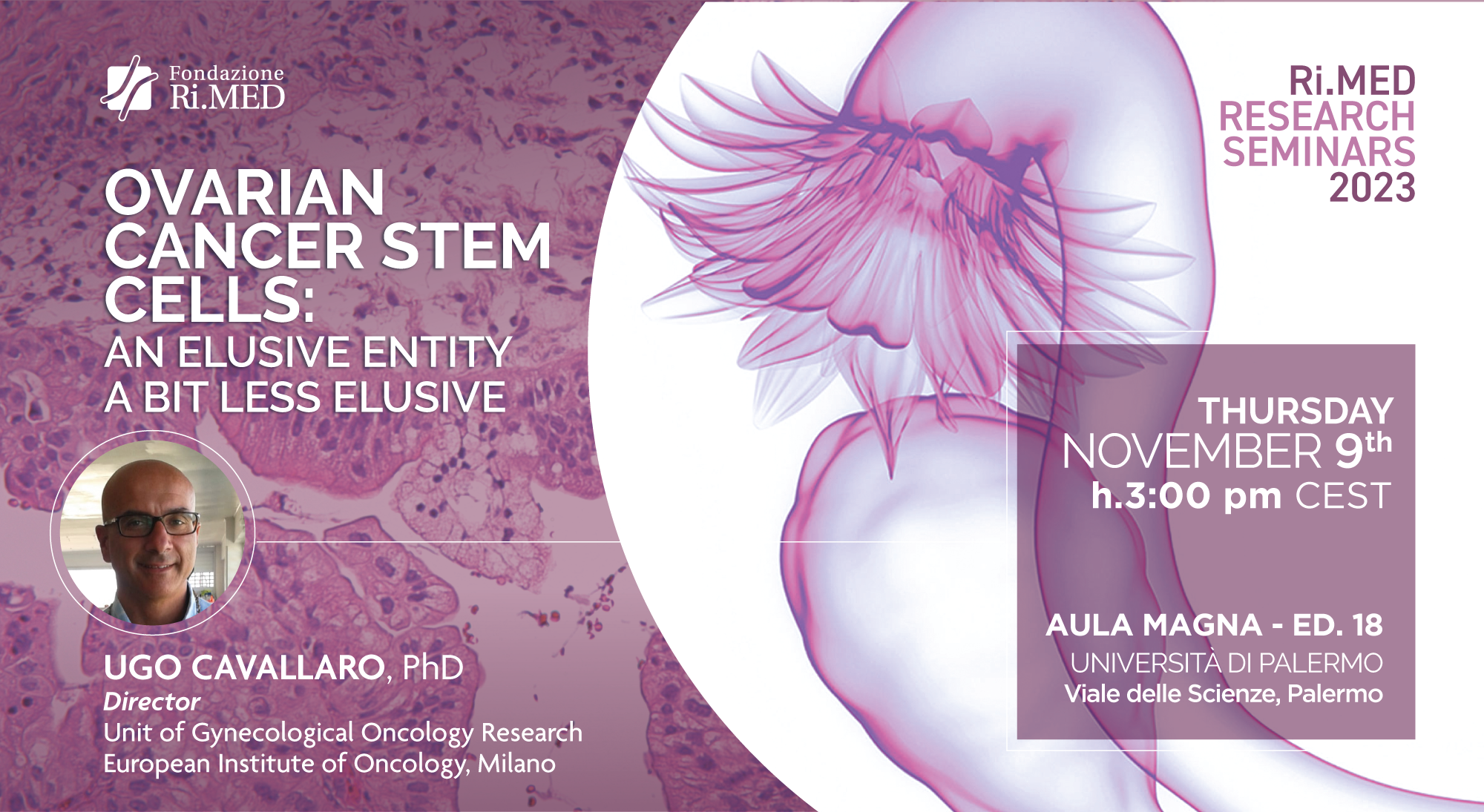The next Ri.MED Research Seminar will be held on Tuesday 9th November at 3.00 pm at University of Palermo, Aula Magna Ed. 18, Viale delle Scienze, Palermo by Prof. Ugo Cavallaro, European Institute of Oncology.
Ovarian cancer stem cells: an elusive entity a bit less elusive
Ugo Cavallaro, PhD
Director Unit of Gynecological Oncology Research
European Institute of Oncology
Milano, Italy
Attendance is free, but registration is required.
Please confirm your attendance by November 8, 2023, filling out the registration form below.
N.B.: in the section “Other” please select the date and then select how you want to participate – in presence or on remote.
For info: adonath@fondazionerimed.com
ABSTRACT: Ovarian cancer (OC) remains an outstanding challenge in clinical and molecular oncology, due to its high rate of relapse and the onset of chemoresistance that, in turn, account for the poor outcome in most OC patients. To improve such a dismal scenario, a better understanding of the cellular and molecular players involved in OC recurrence and drug resistance is indispensable. Towards this aim, our lab investigates a subpopulation of malignant cells, termed ovarian cancer stem cells (OCSC) or tumor-initiating cells, that are thought to drive and sustain OC relapse and therapy escape. To study the role of OCSC in a clinically relevant setting, we established patient-derived organotypic models where OCSC are co-cultured with the peritoneal tumor microenvironment, thus recapitulating the OCSC niche. As it will be presented in the seminar, our approach has started to unravel the impact of tumor microenvironment on OCSC function, unveiling novel molecular determinants and vulnerabilities. The identification and characterization of biological mechanisms that underlie the pathogenic role of OCSC is expected to open new perspectives for the treatment of such a devastating disease with a significant improvement of the patients’ quality of life.
BIOSKETCH: Dr. Ugo Cavallaro received his PhD in Experimental Pathology from the University of Florence and then moved to the Inst. of Molecular Pathology in Vienna for his postdoctoral studies, followed by two years at the University of Basel. During that period, Dr. Cavallaro became interested in the functional role of immunoglobulin-like cell adhesion molecules, and discovered a novel crosstalk between the neural cell adhesion molecule (NCAM) and the fibroblast growth factor receptor (FGFR) (Cavallaro et al., Nat Cell Biol, 2001). He then established his own lab at the Inst. of Molecular Oncology (IFOM) in Milano, where he continued his previous studies showing that NCAM orchestrates the signaling and the trafficking of FGFR (Francavilla et al., J Cell Sci, 2007; Francavilla et al., J Cell Biol, 2009), and that this interplay contributes to ovarian cancer progression and represents also a novel therapeutic target (Zecchini et al. EMBO Mol Med, 2011). Dr. Cavallaro’s group has also discovered novel and unexpected functions of the adhesion molecule L1CAM. For example, he showed for the first time the pro-invasive role of L1CAM in ovarian carcinoma (Zecchini et al., Cancer Res, 2008), and was the first to implicate L1CAM in the vascular endothelium and in tumor-associated vessels (Maddaluno et al., J Exp Med, 2009; Magrini et al., J Clin Invest, 2014, Angiolini et al., 2019). Upon moving to the European Institute of Oncology (IEO) as the Director of the Unit of Gynecological Oncology Research, Dr. Cavallaro established a tight collaboration with the Division of Gynecological Oncology, which enabled him to start translational research projects that build mainly on patient-derived models. Dr. Cavallaro’s research investigates the pathobiology of ovarian cancer, with a special focus on the molecular regulation of tumor dissemination, recurrence and drug resistance. Over the last years, Dr. Cavallaro’s work has identified various mechanisms involved in ovarian cancer progression, including for example new drivers of cancer stemness and epithelial-mesenchymal transition. Dr. Cavallaro is currently coordinating two international consortia that investigate different aspects of ovarian cancer pathobiology, including tumor/microenvironment crosstalk and drug response, and their implications for the clinical management of patients.
For info: adonath@fondazionerimed.com

